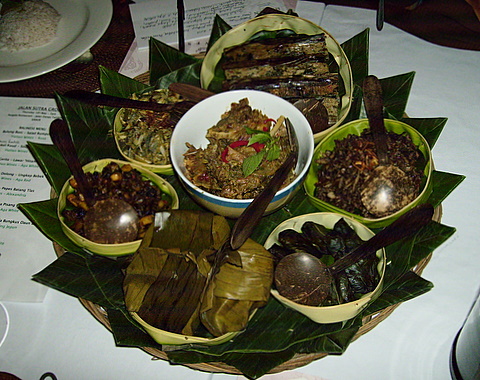
Nyepi is a Balinese "Day of Silence" that falls on Bali's Lunar New Year (March 26, 2009). It is a day of silence, fasting, and meditation. The day following Nyepi is also celebrated as New year Gudi Padva in Maharashtra and Ugadi in Andhra Pradesh and Karnataka in India
Observed from 6 a.m. until 6 a.m. the next morning, Nyepi is a day reserved for self-reflection and as such, anything that might interfere with that purpose is restricted. The main restrictions are: no lighting fires (and lights must be kept low); no working; no entertainment or pleasure; no traveling; and for some, no talking or eating at all. The effect of these prohibitions is that Bali’s usually bustling streets and roads are empty, there is little or no noise from TVs and radios, and few signs of activity are seen even inside homes. The only people to be seen outdoors are the Pecalang, traditional security men who patrol the streets to ensure the prohibitions are being followed.
Although Nyepi is primarily a Hindu holiday, non-Hindu residents of Bali observe the day of silence as well, out of respect for their fellow citizens. Even tourists are not exempt; although free to do as they wish inside their hotels, no one is allowed onto the beaches or streets, and the only airport in Bali remains closed for the entire day. The only exceptions granted are for emergency vehicles carrying those with life-threatening conditions and women about to give birth.
On the day after Nyepi, known as Ngembak Geni, social activity picks up again quickly, as families and friends gather to ask forgiveness from one another, and to perform certain religious rituals together.
First, The Melasti Ritual is performed at the 3-4 previous day. It is dedicated to Sanghyang Widhi/Vishnu-Devas-Bataras and is performed at the beach to respect them as the owner of The Land and Sea.
Second, The Bhuta Yajna Ritual is performed in order to vanquish the negative elements and create balance with God, Mankind, and Nature.
Third, The Nyepi Rituals is performed with the following conditions:
o Amati Geni: No fire/light
o Amati Karya: No working
o Amati Lelunganan: No traveling
o Amati Lelanguan: Fasting
Fourth, The Yoga/Brata Ritual starts at 6:00 AM March 19 and continues to 6:00 AM March 20 (24 hours, dates provided are for 2007).
Fifth, The Ngebak Agni/Labuh Brata Ritual is performed for all Hindu's to forgive each other and to welcome the new days to come.
Sixth and finally, The Dharma Shanti Rituals is performed as the Nyepi Day or "Day of Silence."












